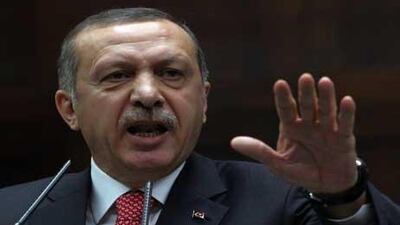ISTANBUL //Turkey said yesterday that it would retaliate against any further "hostile act" by Syria - including troop movements close to the border.
In response to the downing of one of its military jets last week, Recep Tayyip Erdogan, the prime minister, said the rules of engagement of the Turkish armed forces had been changed to allow military strikes against Syrian troops near the border.
In a televised address from Ankara, Mr Erdogan said that Syria had shot down the Turkish surveillance aircraft in international airspace. The two pilots of the Phantom F-4 are still missing.
He said Turkey would retaliate "with determination and take necessary steps by determining the time, place and method by itself in the face of this unfairness".
"Our plane was targeted not by mistake, but out of hostility," he said. "The rules of engagement of the Turkish armed forces have changed given this new development," he said. "Every military unit approaching Turkey's border from Syria will be interpreted as a threat and regarded as a military target."
Mr Erdogan added that the Syrian government should not "make a mistake and put the Turkish government to the test".
Members of the Syrian opposition and analysts said Mr Erdogan's plan, if implemented, would establish a narrow safe zone for anti-regime activists on Syrian soil by threatening military action against Syrian troops entering the strip.
The announcement came as Nato condemned Syria's strike against the Turkish military plane last Friday. But representatives of the 28-nation alliance, gathered in Brussels for an emergency meeting requested by Turkey, stopped short of threatening any military response.
Syria said it did not shoot down the Turkish plane in international airspace. It said it fired on the plane because it had entered Syrian airspace and was interpreted as a threat. Syria said it only found out that it was a Turkish plane after it had been shot down.
"The Syrian government has become a threat to its own people," Mr Erdogan said, in reference to a 16-month-old crackdown against the opposition by Bashar Al Assad, the Syrian president, "but this latest incident shows that the Assad government has become an open threat to Turkey's security. Things have reached a new dimension."
The Turkish prime minister stressed the Turkish plane had been unarmed and on a mission unrelated to Syria.
Pointing to radio and radar records, he said that the pilots of the Phantom F-4 surveillance plane did not receive any warning by the Syrians when they accidentally crossed through Syrian airspace before being shot down. "It was a hostile act," he said.
Russia, a Syrian ally, said yesterday the downing of the jet last week should not be viewed as a provocation nor an intentional move.
"We believe it is important that the incident is not viewed as a provocation or an intentional action, and that it does not lead to destabilising the situation," the foreign ministry said in its first comment on Friday's incident.
But Ayhan Veysel, the chairman of the International Middle East Peace Research Centre, a think tank in Ankara, said yesterday that a military confrontation between Turkey and Syria was now a distinct possibility.
"Even without a violation of the border, Syrian government troops are regarded as hostile and a target for preventive strikes," Mr Veysel said. He noted that Turkey had not attacked Syrian helicopters that strayed into Turkish airspace in recent months. "Now they would be attacked."
Mr Veysel noted that Mr Erdogan had not provided a concrete definition of the area at the border that Syrian troops should not enter. "I would think it's one, two or three kilometres deep," he said. That way, a narrow no-go zone for the Syrian military would be established without sending Turkish troops over the border.
Mahmut Osman, the Turkey representative of the Syrian National Council, an opposition umbrella group, welcomed Mr Erdogan's speech.
"So far, Erdogan has taken the line of: 'There is fire in my neighbour's house, but I am not getting involved'," Mr Osman said. "But now he says: 'The fire has started to affect me as well'."
Mr Osman said Mr Erdogan's announcement that even troop movements within Syria could trigger a Turkish attack would make life difficult for Syrian government forces fighting the rebels' Free Syrian Army.
"If Turkey implements this, a safe zone will come about automatically," Mr Osman said.
Opposition activists have been calling for some kind of safe haven for opposition forces within Syria, arguing such a protected zone would speed up the collapse of the regime in Damascus because it would make it easier for members of the security forces to defect. So far, about 60,000 soldiers and policemen have defected from the Syrian security apparatus, according to Turkish government estimates.
In his speech, Mr Erdogan vowed Turkey would continue to support the Syrian opposition. "The Syrian people are our brothers," he said. "Turkey will give them all kinds of support until they are liberated from this bloodstained dictator."
In fighting yesterday rebel forces and Syrian army units engaged in deadly combat around Republican Guard posts in the suburbs of Damascus, as 86 people were killed across the country, a monitoring group said
The Syrian Observatory for Human Rights said the death toll consisted of 50 civilians, 32 soldiers and four rebels.
Also yesterday, the United States indicated that it was increasingly likely to join an international meeting on the Syria crisis in Geneva this weekend but rejected Russian calls for Iran to take part.
* With additional reporting by Associated Press and Agence France-Presse

